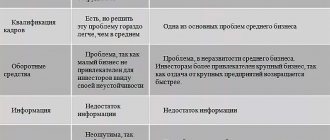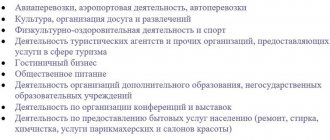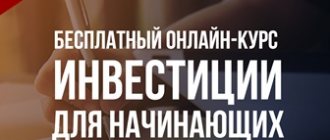Hello! On January 1, 2020, a moratorium on inspections began to apply to small businesses in the Russian Federation. 2020 and 2020 became a continuation of the “vacations” he created. 2019 is also no exception. At the end of 2020, legislative amendments were adopted (480-FZ dated December 25, 2018) extending the moratorium until December 31, 2020.
Of course, the moratorium has become a gift for many small businesses, because where there are inspections, there are also risks of receiving a fine and other penalties.
But before we rejoice for businessmen (or fear for consumers, who theoretically can now receive “unverified” low-quality services), let’s remember which groups of entrepreneurs Law N294-FZ exempts from inspections, and who should not relax ahead of time.
Which organizations are subject to the moratorium?
Until the end of 2020, scheduled inspections of enterprises that meet the criteria of a small business will not be carried out, namely:
- With annual revenue of less than 800 million rubles;
- With a staff of less than 100 people;
- With a total share of state participation in the authorized capital of less than 25%, foreign companies - less than 49%.
These indicators are analyzed over three years. There are no other certificates or licenses confirming that the company belongs to the small business sector.
The moratorium on business inspections also provides a list of exceptions that will not be affected by exemption from inspections. These include:
- Enterprises in the field of healthcare and education;
- Organizations in the field of energy supply and electricity;
- Management companies of multi-apartment residential buildings;
- Organizations dealing with state secrets;
- Audit firms;
- Small business in the field of social services;
- Firms that committed gross violations less than three years before the scheduled inspection.
A detailed list of exceptions is enshrined in parts 1 and 2 of Art. 26.1 of Law No. 294-FZ.
Social responsibility of business
In addition to traditional inspections and test purchases, such formats of communication between the inspector and the businessman as monitoring purchase, random control, inspection visit, and raid are being introduced. At the same time, the prosecutor’s office becomes the main defender of businessmen - all checks will take place only with the consent of the prosecutor and under his control.
In addition, as the head of the department for supervision over compliance with the rights of entrepreneurs of the Prosecutor General’s Office Artem Kononenko said in an interview with an RG correspondent, after the adoption of the law, the entire system of control and supervisory activities in Russia will be based on a risk-based approach. According to it, six categories of risk of possible harm will be introduced - from low to extremely high. And, for example, in a low-risk category, inspections of such an object may not be carried out for several years.
The new law “On state control (supervision) and municipal control in the Russian Federation” was approved by deputies of the State Duma, and then by the Federation Council. It will replace the law in force since 2008, known as Law 294 “On the Protection of the Rights of Legal Entities and Individual Entrepreneurs.” By the way, one of the active developers of the new bill was the Prosecutor General’s Office. As Artem Kononenko said, on behalf of the head of state, relevant legislative proposals were developed by the Prosecutor General’s Office back in 2020. However, following the results of conciliation procedures in the government and the presidential administration, it was decided to apply them in the new law on state control.
“With the onset of the coronavirus pandemic, in order to reduce administrative pressure on business, the government temporarily authorized prosecutors to coordinate all on-site and documentary inspections of regulatory authorities, which made it possible to stop over 7 thousand illegal control measures against business entities in just one quarter of this year,” Kononenko said.
According to him, the successful implementation of these functions by prosecutors became the decisive argument in favor of the legislative extension of this legal institution to the entire new system of control and supervisory activities.
In addition, the adopted law also preserves the well-proven procedure for prosecutors to agree on plans for conducting control and supervisory activities. At the same time, their main result should not be punishment of business, but the prevention of violations in the form of recommendations, consultation and information.
“It is worth noting that during the period of validity of Law 294, when forming annual consolidated plans for conducting scheduled inspections of legal entities and individual entrepreneurs, prosecutors considered proposals from inspectors to conduct over 9.5 million inspection activities. Almost half of them - over 4 million - were rejected due to non-compliance with the requirements of the law,” Kononenko said.
If we talk about annual figures, then in the whole country about 400 thousand business inspections are carried out as planned and another 70-80 thousand are carried out unscheduled.
According to the new law, the functionality of the Unified Register of Inspections, the operator of which remains the Prosecutor General's Office, is also significantly expanded. This state information system will not only change its name to the “Unified Register of Control and Supervisory Activities” - it will also undergo deep modernization. In particular, the new register will accumulate data on all inspection actions, preventive and other activities, as well as decisions of control and supervisory authorities. Currently, only information about inspections and test purchases is included in the Unified Register.
As the representative of the Prosecutor General’s Office especially emphasized, the prohibition established by law on carrying out any control and supervisory activity without first placing information about it in the register is of a fundamental nature. “Failure to comply with this requirement now risks canceling the results of the controller’s entire work,” Kononenko said.
Monitoring purchases, random controls, inspection visits, raids will also be carried out only with the consent of the prosecutor
In addition, the bill involves the abandonment of paper document flow when coordinating unscheduled control activities, forming plans for control and supervisory activities and using the register to digitalize these procedures.
According to Artem Kononenko, the law will come into force on July 1, 2021, and until that moment the Prosecutor General’s Office and lower-level prosecutors will have to carry out a lot of organizational and methodological work in preparation for the implementation of new powers to protect business. If we talk about the expectations of the business community, it already generally assesses the mechanism of prosecutorial supervision as reliable protection of business from unreasonable inspections.
What checks does the moratorium cancel?
The moratorium does not apply to all inspections. We are talking exclusively about the cancellation of scheduled inspections for small businesses - on-site or documentary.
The following will continue to operate as usual:
- Any unscheduled inspections based on complaints about the organization’s work or after accidents and emergencies.
- Tax audits of contributions to extra-budgetary government funds. Prosecutor's, insurance, customs, currency checks and a number of others that are not subject to Law No. 294-FZ.
- Monitoring of objects of hazard classes I and II according to industrial, fire, environmental, and radiation safety standards.
Vacations again: why they decided to extend the moratorium on business inspections
Results of the first moratorium
A moratorium on scheduled business inspections was introduced on January 1, 2020 and will last until the end of 2020. “Supervisory holidays” did not affect enterprises working in the field of supervision of industrial, fire, radiation and environmental safety, as well as audit organizations and companies managing apartment buildings.
Read on RBC Pro
Out of spite Kawasaki: how loyalty defeated competence in Russia Billionaire downshifter: how a mortgage seller got rich by comparing prices So says Gref: there are few people with a “nuclear engine” inside Hiring with a demotion: is it worth hiring a former manager for a linear position
The “supervisory holiday” regime for small businesses has proven its effectiveness, as noted in the report on business problems prepared by the Office of the Business Ombudsman. In some regions, the moratorium helped reduce the number of scheduled inspections by almost half, the report noted. However, it is easy for business supervisors to bypass the moratorium due to the increase in the number of unscheduled inspections and administrative investigations, the authors of the report pointed out. According to Opora Russia, in 2020 the number of scheduled business inspections decreased by an average of 40%.
The government has been repeatedly proposed to extend the moratorium: in particular, in March 2020, the Ministry of Economic Development proposed to make it indefinite, and business ombudsman Boris Titov in December proposed to introduce a moratorium on inspections of all small and medium-sized enterprises, without exception, unless there is a threat to life or health.
Unplanned checks
Unscheduled inspections represent a serious burden for business, states Mikhail Abyzov. They are often a tool of unfair competition and far-fetched pressure on business - it is important to pass a law (the corresponding order of the president is currently being implemented by the government) that fixes the ratio of unscheduled inspections to no more than 30% of planned ones, the minister previously emphasized.
In October last year, the Ministry of Economic Development presented a draft federal law on state and municipal control and supervision, developed on the “open government” platform, which provides for significant reform of supervisory activities. According to the bill that passed the first reading in the State Duma, the authorities will not be able to conduct inspections in the absence of company managers and in cases where a violation can be established without the personal presence of an inspector at the enterprise. In addition, the document consolidates the transition from the “stick” system, according to which the work of supervisory authorities was assessed only by the number of inspections and the volume of fines, to a risk-based approach. Enterprises will be divided into six hazard classes, from low to extremely high, and it is this criterion that will become the basis for determining the frequency of supervision (thus, for the sixth, that is, the lowest risk class, no planned forms of control are provided at all).
Actions in controversial situations
What to do if your organization is included in the inspection plan, but you think that you are subject to a moratorium on prohibiting them? Unfortunately, such planner mistakes do happen, and you need to be prepared for them.
Step 1: Submit to the body that approved the plan an application for exclusion of the organization from the annual plan and a package of documents:
- a copy of the financial results report for the calendar year;
- information on the number of employees;
- for JSC - an extract from the register of shareholders.
Step 2: If the inspection has already begun, you have the right to indicate to the inspectors that there are no grounds for an inspection, confirming this with documents classifying you as a small business (the list of documents is similar to the previous paragraph).
Ignoring the requirements of the moratorium is a legal basis for considering the results of the inspection invalid.
Inspections of organizations and entrepreneurs in 2020
The Government of the Russian Federation, by resolution No. 438 dated April 3, 2020, established the features of state and municipal control (supervision) in 2020. It's all because of the coronavirus pandemic.
Supervisory holidays
Until the end of 2020, small and medium-sized businesses were exempted from scheduled inspections.
The types of permitted unscheduled inspections were established, as well as cases when officials were allowed to travel to conduct them.
The procedure for conducting supervisory inspections is regulated by Federal Law No. 294-FZ dated December 26, 2008 “On the protection of the rights of legal entities and individual entrepreneurs in the exercise of state control (supervision) and municipal control.” These are inspections by sanitary and epidemiological stations, fire departments, labor inspectorates, local governments, etc.
The commented resolution comes into force on April 14, and it affects all types of state control (supervision) provided for by Federal Law No. 294-FZ of December 26, 2008, with the exception of tax and currency control. Also does not apply to customs checks carried out by customs authorities.
Who does the regulation apply to?
A special procedure has been established for:
- companies and individual entrepreneurs classified as SMEs, information about which is included in the unified register of small and medium-sized businesses;
- non-profit organizations whose average number of employees in 2020 does not exceed 200 people.
An exception is political parties and non-profit organizations included in the register of non-profit organizations performing the functions of a foreign agent.
What checks should you expect?
In relation to these payers in 2020, only unscheduled inspections can be carried out, and only if:
- there are facts of harm to the life or health of citizens or the threat of such consequences, the occurrence of emergencies of a natural or man-made nature (only in agreement with the prosecutor’s office);
- it is necessary to monitor the execution of a previously issued order to eliminate violations that create an immediate threat of harm to the life and health of citizens (only in agreement with the prosecutor’s office);
- the order to conduct an inspection was given by the president or the government indicating a specific company or individual entrepreneur, and also when there is a request from the prosecutor to conduct an unscheduled inspection as part of supervision over the implementation of laws based on materials and appeals received by the prosecutor’s office;
- an application has been received from a legal entity or individual entrepreneur for the provision of legal status, special permission for the right to engage in certain types of activities or to carry out other legally significant actions;
- there is a request from licensees for licensing authorities to conduct unscheduled on-site inspections to determine whether the orders of such authorities have been fulfilled ahead of schedule;
- it is necessary to control the fact of execution of a previously issued order, the implementation of which renews the previously suspended license, accreditation or other permit.
Please note: the listed types of inspections will also be carried out in relation to companies and individual entrepreneurs that are not classified as SMEs. In addition, they will continue to undergo scheduled inspections if the company’s activities or the production facilities it uses relate to:
- high or extremely high risk categories;
- first class (category) of danger;
- first hazard class of hazardous production facilities;
- first class hydraulic structures.
Scheduled inspections will not be canceled for those organizations that are subject to the regime of constant state control (supervision).
Keep in mind that no one is exempt from inspections by the prosecutor's office. Most often, prosecutors check companies and entrepreneurs based on received complaints from employees.
How will they check
Inspections are carried out only using means of remote interaction, including audio or video communication, with the exception of certain cases.
The travel of officials of state control (supervision) bodies and municipal control bodies during inspections is allowed in some cases. For example, when the departure of officials of state control (supervision) bodies, municipal control bodies is provided for by order of the President, order of the Government, or requirement of the prosecutor.
Please note that decisions to exclude firms and individual entrepreneurs from annual plans for routine inspections must be made within 7 working days after the commented resolution comes into force.
As officials explain, all these measures are related to the epidemiological situation in the country and are aimed primarily at fighting the infection, preserving the life and health of citizens and supporting business during the pandemic.
Reduced inspections during quarantine gave businesses optimism
Limiting inspections by control and supervision bodies has made it possible to significantly reduce administrative pressure on business, as follows from the report of the Russian Union of Industrialists and Entrepreneurs and the Higher School of Economics. For certain types of supervision, inspections during the “quarantine months” were reduced to almost zero, while businesses began to complain less frequently about inspections “invisible” in the register. The authorities intend to extend the regulatory measures until 2022, and experts indicate that they will have a positive impact on the development of the entire control and supervision reform.
Over the five months of 2020, the number of inspections decreased by 47% compared to the same period in 2020, and during the maximum restrictions (April and May) - by 85%, follows from a joint report of the Russian Union of Industrialists and Entrepreneurs and the Higher School of Economics based on data from the Unified Register of Inspections ( ERP). Let us recall that measures to reduce administrative pressure on the economy were included in the government’s first anti-crisis support package and were supposed to last until May 1, but have already been extended until the end of the year. Thus, scheduled inspections are completely canceled for small businesses, but can be carried out in relation to large businesses when operating production facilities with a high and extremely high degree of risk. Unscheduled inspections are also limited.
Contrary to the expectations of experts about a greater reduction in the volume of scheduled and on-site inspections, the reduction in control and supervisory activities was generally uniform, the report shows.
At the same time, unscheduled inspections in April and May 2020 began to be carried out less frequently by 87%, scheduled inspections by 80%, on-site and documentary inspections by 86% and 82%, respectively. The number of those checked decreased by 80% - from 130.7 thousand to 27 thousand. The largest decrease was shown by Rospotrebnadzor and FMBA, which are responsible for combating the epidemic - 95% and 96%, respectively. The authors of the report explain the indicators by saying that the main resources of departments were diverted to tracing the contacts of infected people, organizing quarantine and other anti-epidemic measures. In the regions, housing inspections have decreased significantly - in April and May by 99%.
According to a May survey by Support Russia, the announced moratorium on inspections was generally observed.
About half of the entrepreneurs interacted with tax inspectors during desk audits; there are a number of cases of prosecutorial audits and administrative investigations that were not subject to the ban. “There was no particular severity of inspections: the moratorium worked,” said Vladislav Korochkin, first vice-president of Opora Russia.
How administrative pressure was measured for businesses
“During the period of restrictive measures, control measures actually became fewer. And this applies not only to checks under the law on the protection of legal entities and individual entrepreneurs (FZ-294), which are included in the ERP, but also to all others,” Boris Titov, Commissioner for the Protection of the Rights of Entrepreneurs, told Kommersant, regularly pointing out the growth “ invisible" in the ERP inspections (administrative investigations, test purchases, etc., see Kommersant of May 27). According to him, isolated violations are stopped by the control and supervisory authorities themselves or the prosecutor's office.
The success of deregulatory measures is not least due to the fact that most enterprises were closed - de facto, there was simply no one to check. However, as Valery Kazikaev, head of the RSPP Committee on Permitting, Control and Supervision Activities, explained to Kommersant, the moratorium became a kind of test of the strength of the control system, which it should become in the post-reform period. “The reduction in inspections for small businesses did not lead to negative consequences for consumers, which confirms the ability of businesses to independently and responsibly approach compliance with state requirements. The progress of the reform itself maintains its pace. Moreover, we saw the state’s readiness to speed up this work,” he added. It should be noted that the authorities intend to continue the course of deregulation: the abandonment of scheduled inspections for small businesses, their noticeable limitation for large ones and the reduction of unscheduled ones until 2022 were included in the economic recovery plan. At the same time, the government indicates that inspectors will have to rely on the experience of 2020: thus, the number of inspections should not increase significantly in the future.
Diana Galieva
How to protect your business during inspections
Relations in the field of organization and implementation of state control (supervision), municipal control (hereinafter referred to as control) and protection of the rights of legal entities and individual entrepreneurs in the exercise of control are regulated by the Federal Law of December 26, 2008 No. 294-FZ “On the protection of the rights of legal entities and individual entrepreneurs in the exercise of state control (supervision) and municipal control" (hereinafter referred to as the Law on the Protection of the Rights of Legal Entities or Law No. 294-FZ).
In this article, we will consider the main provisions of Law No. 294-FZ, knowledge of which will help protect the company during inspections, outline the basic rights of the persons being inspected and consider the features of the most frequently carried out types of inspections, and also indicate a list of inspections that are not subject to the provisions of the Protection Law rights of legal entities.
Inspection of legal entities should be scheduled
The principles of protecting the rights of legal entities and individual entrepreneurs (hereinafter referred to as the protection of the rights of legal entities) when exercising control are established in Art. 3 of the Law on the Protection of the Rights of Legal Entities.
The main principle, aimed specifically at protecting the rights of legal entities when exercising control, in our opinion, is the openness and accessibility of the following information to the persons being inspected (provided that the dissemination of such information is not prohibited or limited in accordance with the legislation of the Russian Federation):
- on the organization and conduct of inspections;
- on the results of inspections and measures taken to suppress and (or) eliminate the consequences of identified violations;
- on the rights and obligations of state control bodies and their officials.
In order to implement this principle, a unified register of inspections is maintained in the Russian Federation.
What will happen
So what happens now? Of course, it cannot be said that from now on small businesses and other enterprises will be constantly checked. After all, we know what country we live in, and that such checks may not always have a positive effect on employees. This can have negative trends for everyone. But if we consider the ideal situation, then in fact at the moment there are more reasons and grounds for which verification can be carried out. Now anyone who sees fit, even if he has nothing to do with the employer, can complain.
Such a complaint is a full basis for the inspection to immediately respond to such facts and come to the enterprise.
For example, everyone knows very well that many employers sin by not wanting to hire employees specifically under an employment contract. They advise all staff (if there are few of them, of course) to register themselves as individual entrepreneurs and pay all applicable taxes and fees themselves. This relieves the employer of responsibility for the fact that a certain individual entrepreneur did not pay tax, social contribution, etc. At the same time, the company itself has every right not to pay such employees any compensation payments, either upon dismissal, or upon retirement, sick leave, etc. There is no social package for individual entrepreneurs from the employer.
So, any employee working under such a relationship has every right to complain if he really is not an individual entrepreneur and does not want to pay his own fees. The labor inspectorate has no right not to respond. Another example when the labor inspectorate must respond is related to the conclusion of civil contracts. Everyone knows very well that such agreements are now being actively implemented. The main difference between such a document and an employment agreement is that in this case the employee is a performer, not an employee, and the employer is the customer of the service. In this case, no one should provide the performer with all the supplies for the work, for example, provide a uniform, stationery, tools, etc. In addition, in this case, no one will pay bonuses, vacations and sick leave. The only thing the employer must do is become a tax agent for personal income tax. That's all. So, with this work algorithm, the employee also has the right to complain. But any other person, for example, his loved one, who considers such a situation unfair, can complain. And the inspection must respond to this fact. So now businesses need to be prepared. An unscheduled inspection can happen at any time and, most importantly, without 24 hours notice. The effect of surprise must work.
Protection from government inspections during a pandemic
One of the economic support measures from the Government during the pandemic was the suspension of business inspections until 05/01/2020.
on the part of regulatory authorities; further, remote inspections have been established for SMEs. Thus, a moratorium has been established until the end of 2020 on conducting scheduled inspections in accordance with Decree of the Government of the Russian Federation of April 3, 2020 N 438.
This provision applies to small and medium-sized businesses (SMEs) operating buildings and structures, as well as non-profit organizations whose number of employees in 2020 does not exceed 200 people, with the exception of political parties and non-profit organizations.
The requirements of clause 1 of the Decree of the Government of the Russian Federation dated 04/03/2020 N 438 allow for unscheduled inspections, including:
the grounds for which are facts of harm to the life and health of citizens or threats of harm to the life and health of citizens, the occurrence of emergencies of a natural and man-made nature, the implementation of which is agreed upon by the prosecutor's office;
appointed in order to verify the execution of a previously issued order to take measures aimed at eliminating violations that entail an immediate threat of harm to the life and health of citizens, the implementation of which was agreed upon by the prosecutor's office;
on instructions from the President and Government of the Russian Federation.
As an exception, scheduled inspections of the following objects are allowed (clause 2 of the Decree of the Government of the Russian Federation of 04/03/2020 N 438):
- Hazard class I of hazardous production facilities;
- Class I hydraulic structures;
- in respect of which a regime of constant state control (supervision) has been established.
Systematic monitoring will still be carried out, but in online mode (remote checks, go to reading). In some cases, on-site inspections will be replaced by documentary checks. Some unscheduled inspections cannot be cancelled.
If the company is included in the inspection plan, there will be no inspection before May 1. If the inspection has already begun and the control and supervisory authorities have completed more than half of the supervisory activities, the control will be completed. Most likely in documentary mode.
As we see, some unscheduled inspections will be carried out in any case. This applies to cases where: there is a threat to the health and life of citizens; an emergency of a natural or man-made nature occurs; We are talking about permitting documentation: accreditations, licenses, etc. The feasibility of unscheduled inspections will have to be coordinated with the State Prosecutor's Office. This will optimize the number of trips and reduce the number of social contacts for inspectors and employers.
These measures to adjust scheduled inspections for 2020 are related to ensuring sustainable economic development in the context of the coronavirus pandemic.










